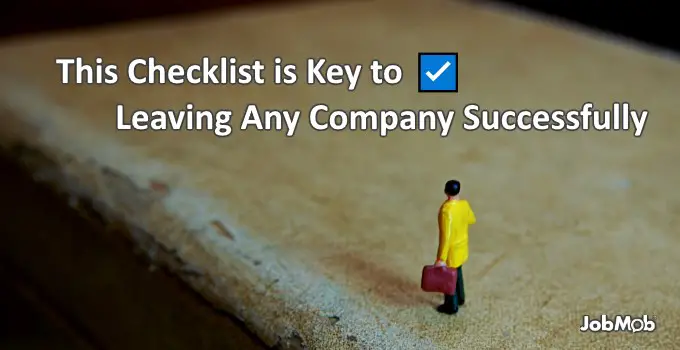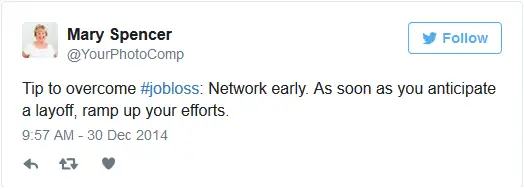The 25-point layoff success checklist that tells you what to do when you're laid off.

Some companies are ruthless with layoffs, locking you out from their computer network and walking you to the door as soon as notification has been given.
Don't wait until you're saying “I've been laid off, now what?”
Even if your ex-employer-to-be isn't that harsh, prepare yourself in advance once you feel a layoff might be coming your way.
Free bonus: Download a PDF version of this article to use as a handy reference.
25 actions to achieve layoff success
- Ask for recommendation or reference letters from ‘higher-ups' – or even LinkedIn Recommendations – and agree how to collect them.
- Update your resume or CV.
- Research your employee termination rights and what to do if they're not respected.
- Calculate how much money the company owes you in unpaid salary, vacation time, bonuses, etc.
- Learn about severance pay: how much to expect, the company's deadline for paying by law (e.g. in Israel, within 30 days of dismissal) and what you need to do to collect it.
- List the documentation that the company is required to give for e.g. unemployment benefits, income tax, joining another employer, etc., such as a pink slip or other end-of-work certificate.
- Find out which documentation the company will expect you to sign before leaving.
- Chat with an HR representative about getting your rights.
- Ask about access to outplacement services or a parent or sister company that can take you in.
- Get your personnel folder.
- Have a last chat with your boss. Where relevant, discuss the possibility of returning as a freelance consultant.
- Find out which remaining work tasks you need to accomplish before you leave.
- Know to whom you need to transfer your responsibilities and start doing so.
- Contact business partners & clients about the change in contact person on your now ex-projects. Start with the contacts you know are hiring. Ask for job referrals at the same time and attach your newly-updated resume. A nice touch is to remind them of some success you had with them or for them, and then thank them for their business during your time at the company.
- Say goodbye to colleagues. If possible, take time to walk around the office on your last day and say goodbye personally. Then send a goodbye email to people out of the office or at another location. Ask for referrals and attach your updated resume. You never know where a job lead can come from.
- Get all your colleagues' and business partners' contact information and connect with them on social media so that you can network with them later during your job search.
- Collect recommendation or reference letters.
- Complete remaining work tasks and the hand-off of responsibilities.
- Make copies of your work to add to your work portfolio (where relevant).
- Backup information related to your work achievements such as statistics, emailed compliments and thank yous.
- Remove all personal files from your work computer.
- Give back equipment such as your company car, cell phone, laptop, uniform, security badge, etc.
- Confirm that the company has respected your rights and given you all money and documentation owed.
- Sign company documentation as requested but only if you've received all your entitled rights.
- Pack up all your personal belongings to take home.
Bonus #26: Leave a good impression
Layoffs are never easy for everyone involved. Deal with them like a professional and the good impressions you leave will only help you in finding your next job. If the company's situation improves, they might want you back or if you get laid off from another job, you may want to come back later.
Here's an inspiring story of why you should never burn your bridges:
“Fairly early in my career, I had to implement a RIF (Reduction In Force = layoff) for 1/3 of my department about 15 people in the terrible economy of late 2001. This was purely a monetary issue for the company all these folks were decent performers, however, they were chosen because they were in the bottom 1/3 in terms of performance.
The one thing I learned, is that you get to see a side of a person that you would never see outside a termination : how they react to the worst work news they could possibly get. Out of the 15 people some people were angry at the company and really angry at me, some people cried, and some people handled it amazingly well – so well that in 2 or 3 cases I decided that this person was so reasonable and so mature that I would have been better off firing someone else. In fact, one person said to me, “I'm really bummed out because I love working here, but I understand. Wow, this must be incredibly hard to fire all these people, how are you holding up?”.
While I could not reverse the fact that these people were being RIF'd and I had tried to help all 15 people with new jobs and references, it was hard not to work extra hard for the people who I thought handled it well.
To this day I have a great “last impression” of them. It made me feel better about recommending them for a new job, and in one case I was actually able to hire one person back 6 months later when I got additional head count.”
Share this checklist with anyone you know who just got laid off or is worried about it. Best used when printed out.
What not to do on your way out
21 Evil Things To Do On Your Last Day On The Job
Subscribe to JobMob via RSS or email and follow me on Twitter for more practical advice for surviving a layoff.





I can relate to #15. We recently had a small five person RIF in my department. I think three handled it well, one guy I heard was furious, and one guy was sort of relieved actually and did take advantage of the company policy of allowing people to stick around and clean up. Didn’t hide from people, still went to lunch with fellow workers, etc… and left a good impression. Not that he’ll want to come back though 🙂
Pingback: Jacob Share
Pingback: Jacob Share
Pingback: Jacob Share
This is such a great and comprehensive list, apologies if I repeat anything. It really depends on what country you live in, but I’d also suggest:
A) Get all the contact info you need with regard to any retirement plans you have via the company (401k, etc). In one case it took ages to get the info after I left the company. Sadly, some companies may care (a lot) less for you after you left.
B) Do your homework on any insurance or other benefit programs you may have, it may help ensure they transfer smoothly to the next job.
C) If you have stock in a company and can/will take it with you, consider switching to a broker of your own choosing. Remember that the broker the company chose for their program, is executing on the company’s policy/wishes first (ie, their customer), you second.
Pingback: Paul DeBettignies
Pingback: Paul DeBettignies
Pingback: Paul DeBettignies
Pingback: Recommended Site: JobMob : Balance Force
Pingback: Before You Leave «
Pingback: Before You Leave |
Pingback: Employee Layoff Rights in Israel: What Are They? | JobMob
Pingback: Jacob Share
Pingback: On Personal Brand Destruction, Hockey and the 2010 Winter Olympics | JobMob
Pingback: Jen Loong
Very nice article, should be helpful for people in need. We should all be prepared for the worse in this economy.
I have drafted a comprehensive list of 20 things to do when you are on the verge of being laid off. Do check out the link if interested. I will be glad if you get benefitted by the list.
http://onecentatatime.com/20-things-to-do-before-you-lose-your-job/
Pingback: Suspect A Mass Layoff At Your Company? Here's What To Do | JobMob
Pingback: 21 Evil Things To Do On Your Last Day On The Job | JobMob